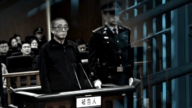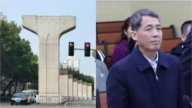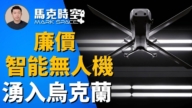【新唐人2015年2月9日讯】近两年来“老虎”和“苍蝇”已成为落马中共官员的特色代名词。最近中纪委表示,留给“老虎”和“苍蝇”的时间不多了。自中共十八大以来,“老虎”、“苍蝇”不断落网,而中纪委的最新表态,又在释放什么样的信号?请看专家分析。
中纪委监察部网站2月4号刊文,对2015正风反腐前瞻。文章说,中共中央已布好局,各地各部门势必加紧“落子”。随着纪检体制改革推进的“最后一公里”由省压到市、市压到县,对包围圈逐渐“收口”,留给大大小小“老虎”、“苍蝇”的时间已经不多了!
这样的表述,似乎预示着将会有一大批的“老虎”、“苍蝇”应声落马。甚至有评论说,中纪委如此措辞,堪称“决战檄文”,也是对“打虎”运动主导者--中共总书记习近平此前“反腐上不封顶”、“还没有取得压倒性胜利”等讲话的呼应。
时事评论员邢天行:“它实际上是对各省市以及下边大大小小的腐败份子,给出一个非常严厉的警告。现在中纪委的权力已经很大了,它连徐才厚、周永康以及大大小小他们身边身居高位的人,都能拿下去,它还怕省、县这样下边的‘小老虎’吗?它想动还不容易吗?它为什么还要说反腐的问题是严峻复杂的呢?”
时事评论员邢天行表示,因为真正的“大老虎”,是江派领头人物曾庆红和江泽民之流,而这样的人中纪委实际上还没动着。
此外,中纪委监察部网站的文章在开篇提到,中共纪检体制改革正在推进,1月30号,中共中央深改组审议通过了3个具体举措。其次,文章声称党内监督专责机构逐渐发挥作用。
邢天行:“它这个从上至下的一个不落的,要垂直建立这样一个相对独立的监管体制,就等于是从上至下的,把江泽民时代用人的,包括大大小小的‘苍蝇’、‘老虎’全部都监管起来。那在他自己的权力上,他也会达到他希望所要达到的那种绝对的领导。”
今年1月以来,习近平接连召开中共高层会议,释放继续反腐、锁定地方“关键少数”,并作出种种强硬表述。
1月中旬,中共《人民日报》称反腐没有“铁帽子王”,2月3号中纪委网站再次刊文,高调宣称“在贪腐问题上,没人能当铁帽子王”,传递强硬信号。“铁帽子王”的说法,被外界解读为是官方暗示江泽民等可能随时落马。
那么,接下来的“打虎”走向会怎样呢?
邢天行:“再进一步运行的话,相应的在省、市下边各种各样的‘老虎’、‘苍蝇’会出现的越来越多,就是被他拿掉的越来越多。这只是说对下。他对上呢,他肯定还是要进一步的借助前期已经形成的势态,进一步向纵深去扩展。也就是说他要把最后的、更大的‘老虎’给拿下来。”
毫无疑问,这场声势浩荡的“打虎”运动,令一众“老虎”、“苍蝇”惶恐不安,也确实取得一些民意的支持。但在打掉一批批的“老虎”、“苍蝇”后,中共的反腐运动是否会改变路径,走上舆论普遍期盼的民主道路?
中国问题独立评论员李善鉴:“它上边的反腐基本上是权力的斗争,特别是新上来的习近平集团和以前江氏集团政治上的角逐。可是反映到下边呢,那个目的就是挽回民心。但是呢,这种目的根本它是达不到的。造成中共腐败,问题就出在中共本身这种机制。”
对于中共官场大面积而且根深蒂固的腐败问题,中国问题独立评论员李善鉴表示,最捷径的办法,就是把中共整个宣传的那一套暴力、虚伪的反人类价值体系抛弃掉。当然抛弃掉这些的话,中共也就不存在了。
李善鉴:“所以共产党它想倒腐败的话,根本不可能有一个好结果的。”
据中共官方通报,2014年中共有68名中管官员被查,其中军队有16名高级军官落马。
进入2015年南京市委书记杨卫泽、中共国安部副部长马建、甘肃省人大常委会副主任陆武成陆续落马。中共《人民日报》3号发文称,这“开年三虎”拉开了新一年的“打虎序幕”。而《中国纪检监察报》同一天的报导,则加上了1月中旬落马的另一只“老虎”中共国家旅游局副局长霍克。
采访/陈汉 编辑/王子琦 后制/舒灿
Communist Central Disciplinary: Time Is Running Out
Tigers and flies have been synonyms
for sacked communist officials.
The Central Commission for Discipline Inspection (CCDI)
claimed time is running short for tigers and flies.
Numerous tigers and flies have been sacked since the 18th
National Congress and the majority of them
belong to the Jiang faction.
CCDI’s recent release has people question the meaning
of the signal.
Let’s take a look.
The CCDI Website issued prospects of anti-graft in 2015.
It urged local sectors to speed up relevant arrangements
to collaborate with the Central.
Following the reform and development of discipline
and inspection from province to city and county,
the net is tightened.
The time left for the various tigers and flies is running out!
This statement seems to suggest a large number of them
will fall.
The statement was also commented on as “a decisive battle call
to arms" and an echo of what Xi Jinping declared earlier,
“no title cap on anti-corruption"
and “the landslide victory is yet to come."
Commentator Xing Tianxing: “It is actually a very stern
warning to the corrupt elements at all levels.
The immense power of the CCDI is shown in the downfall
of Xu Caihou, and Zhou Yongkang.
Isn’t it easy to handle those junior tigers at the local
level?
So why would it suggest that anti-graft is still grim
and complicated?"
Xing Tianxing explains that the real tigers are the leaders
of the Jiang faction such as Jiang Zemin, Zeng Qinghong and
his ilk.
They are the ones the CCDI has yet to tackle.
In the CCDI statement, it was described that reform
in the discipline and inspection organ is taking place,
such as the central restructuring team has passed
three specific initiatives on Jan. 30.
The internal supervision mechanism is also gradually
put into function.
Xing Tianxing: “This top-down regulatory mechanism is
equivalent to enclosing all flies and tigers from Jiang Zemin’s era.
It’s also a way for the regime leader to reach absolute authority."
Since January, Xi Jinping has released a series of tough talks
targeting corruption against “critical" local elites.
In mid-January, People’s Daily commented that
‘iron-cap princes’ don’t exist in the anti-graft campaign.
On Feb. 3, CCDI also sent a strong signal that no one will be
an “iron-cap prince" in the campaign.
The so-called “no iron-cap princes" was interpreted as
meaning Jiang Zemin and the like will fall at any time.
So, where will the tiger hunt lead to?
Xing Tianxing: “There will be more of the various tigers
and flies in the provinces and cities as it goes down to local.
It will surely expand further up taking the momentum
from previous effort.
The final and the biggest tiger will eventually be hunted down."
There is no doubt that this campaign has frightened many
tigers and flies and earned some support from the public.
But after hunting down the tigers and flies one after another,
will the anti-corruption change its route to what’s been
yearned for by the public: democracy?
China issue independent commentator Li Shanjian:
“The essence of anti-corruption is basically a struggle for power,
or better put, a competition between the new Xi faction
and the old Jiang faction.
It is said to win people’s support to the society.
However, there is no way to reach the purpose (democracy),
because Communism itself is the fundamental mechanism
of the corruption."
Li Shanjian indicates the shortcut to resolve the massive
and deep-rooted corruption in the Communist regime is
to discard the entire violent, hypocritical and anti-humanity
mechanism of the Communist.
However, that of course means
the Chinese Communist Party perishes.
Li Shanjian: “That’s why there won’t be any good result
out of the regime’s anti-graft campaign."
According to China’s official record, a total of 68 officers
were checked in 2014.
Among whom, 16 were senior officers from the army.
Since the beginning of 2015, the regime has sacked three
officials, including Nanjing municipal Party secretary, Yang Weize,
Ministry of State Security vice minister, Ma Jian, and Gansu
Provincial People’s Congress deputy director, Lu Wucheng.
While People’s Daily named them the Three Tigers prelude
in the New Year, CCDI released another sacked tiger,
National Tourism Administration deputy director, Huo Ke.
Interview/ChenHan Edit/Wang Ziqi Post-Production/ShuCan






























